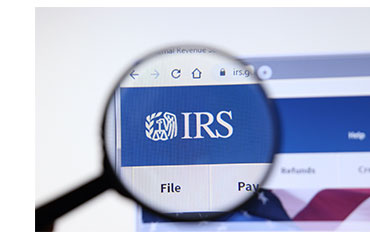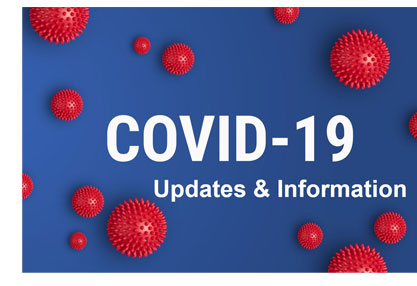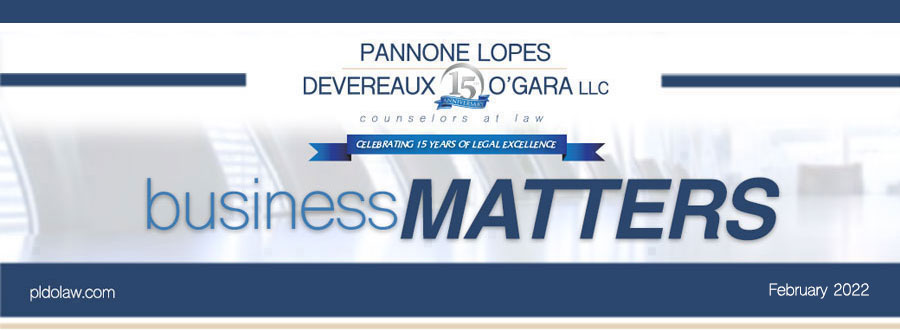THIS ISSUE'S HEADLINES
PLDO Plays Role in Victory in Rhode Island Supreme Court
The SAFE Banking Act: Will 2022 Open the Door for Cannabis Businesses to Access Commercial Banking?
The Self-Employment Tax Exemption for Limited Partnership Earnings Under IRS Scrutiny
Stay Informed — PLDO COVID-19 Resource Library

PLDO PLAYS ROLE IN VICTORY IN RHODE ISLAND SUPREME COURT
 PLDO Partner Brian J. Lamoureux served as local counsel for various Bridgestone Americas entities in a case where the plaintiff alleged that the failure of a Bridgestone tire led to a fatal accident. Bridgestone claimed in the Superior Court that Rhode Island courts lacked personal jurisdiction over the Bridgestone entities and, therefore, the case should be dismissed as to Bridgestone. The Superior Court agreed and affirmed dismissal of plaintiff’s case against the Bridgestone entities, and the plaintiff appealed to the Rhode Island Supreme Court. PLDO Partner Brian J. Lamoureux served as local counsel for various Bridgestone Americas entities in a case where the plaintiff alleged that the failure of a Bridgestone tire led to a fatal accident. Bridgestone claimed in the Superior Court that Rhode Island courts lacked personal jurisdiction over the Bridgestone entities and, therefore, the case should be dismissed as to Bridgestone. The Superior Court agreed and affirmed dismissal of plaintiff’s case against the Bridgestone entities, and the plaintiff appealed to the Rhode Island Supreme Court.
While the plaintiff’s appeal was pending in the Rhode Island Supreme Court, the United States Supreme Court issued two much-anticipated and important decisions in similar cases that were brought against Ford Motor Company. In those Ford cases, the primary issues were the extent to which state courts could exercise personal jurisdiction over a manufacturer who sells products that ultimately cause injury elsewhere in the country. The concept of personal jurisdiction is important in American jurisprudence: courts will only require defendants to appear and defend claims in a state if there are sufficient minimum contacts with that state such that it would be constitutional and fair to require those defendants to appear and defend against claims brought in those states. The Bridgestone entities argued in the Rhode Island Supreme Court that, in light of existing Rhode Island precedent and the recent Ford decisions, Rhode Island courts could not exercise personal jurisdiction over the Bridgestone entities in Rhode Island.
The Rhode Island Supreme Court agreed with Bridgestone and denied plaintiff’s appeal. In its holding, it carefully analyzed the facts of the case and applied them to the Court’s prior precedent and the U.S. Supreme Court’s decisions in the Ford cases. The Court determined, among other things, that because the accident occurred outside of Rhode Island, it would not be proper or fair to require Bridgestone to defend plaintiff’s claims in Rhode Island even though Bridgestone markets its products worldwide and had some presence in Rhode Island. Although cases involving the proper scope of personal jurisdiction rise and fall on the particular facts of each case, the Court’s decision in Bridgestone is significant because it is the first time the Rhode Island Supreme Court analyzed a personal jurisdiction appeal under the framework set forth in the Ford cases.
For further information, please contact Attorney Lamoureux at 401-824-5100 or bjl@pldolaw.com.
[back to top]

THE SAFE BANKING ACT: WILL 2022 OPEN THE DOOR FOR CANNABIS BUSINESSES TO ACCESS COMMERCIAL BANKING?
 Lawful cannabis businesses in the United States have historically and predominately relied on private funding to establish and prop up their operations until they can sustain themselves as revenue-driven enterprises. This is because cannabis remains illegal under federal law and, by extension, FDIC-insured banking institutions face substantial risk accepting cannabis funds and/or offering financial services to cannabis companies. As a result, only those with access to private capital have generally been able to enter the marketplace. Lawful cannabis businesses in the United States have historically and predominately relied on private funding to establish and prop up their operations until they can sustain themselves as revenue-driven enterprises. This is because cannabis remains illegal under federal law and, by extension, FDIC-insured banking institutions face substantial risk accepting cannabis funds and/or offering financial services to cannabis companies. As a result, only those with access to private capital have generally been able to enter the marketplace.
The Secure and Fair Enforcement Act, more commonly known as the “SAFE Banking Act” may soon aid in levelling the playing field among marijuana upstarts. At its essence, the Act prevents the United States’ banking regulator from “penalizing a depository institution for providing banking services to a legitimate cannabis-related business.” Passing in the house of representatives in 2019 and 2021 with bipartisan support, the Act is steadily gaining momentum in Congress. Most recently, the Act was introduced as an amendment to the National Defense Authorization Act for Fiscal Year 2022 in the Fall of 2021 with political endorsement from approximately half of the State Governors at that time. As more states legalize and regulate marijuana for adult use, thereby recognizing the economic benefit of this multi-billion dollar industry, it is increasingly likely that the SAFE Banking Act becomes a reality.
To summarize, the SAFE Banking Act’s intended effect would be to: (i) prohibit a federal banking regulator from terminating or limiting a bank’s FDIC insurance because the institution provides financial services to a legitimate cannabis-related business, (ii) legalize bank proceeds from banking transactions with cannabis-related businesses, and (iii) permit banking institutions to lend monies to legitimate cannabis-related business. The foregoing are each critical to the equitable growth of cannabis businesses throughout the country. All eyes will be on D.C. this year and cannabis businesses should begin to prepare for possible federal legislation that would open the door on interstate commerce, commercial banking access, and federal tax deductions. If you have questions pertaining to the SAFE Act or any other cannabis business matters, please contact PLDO Partner Benjamin L. Rackliffe at brackliffe@pldolaw.com.
[back to top]

THE SELF-EMPLOYMENT TAX EXEMPTION FOR LIMITED PARTNERSHIP EARNINGS UNDER IRS SCRUTINY
 The exception allowing limited partnership earnings to avoid application of the self-employment tax has come under increased IRS scrutiny and legislative focus. Generally, the distribution of limited partnership income to a limited partner is not subject to self-employment tax. The self-employment tax is levied at the rate of 15.3% - not an inconsiderable amount. The IRS has successfully taken the position against application of the exception in several cases. The exception allowing limited partnership earnings to avoid application of the self-employment tax has come under increased IRS scrutiny and legislative focus. Generally, the distribution of limited partnership income to a limited partner is not subject to self-employment tax. The self-employment tax is levied at the rate of 15.3% - not an inconsiderable amount. The IRS has successfully taken the position against application of the exception in several cases.
Consider the Renkemeyer case (Rankemeyer, Campbell & Weaver, LLP, 136 T.C. No. 7 (2011). In a nutshell and amongst other issues, this Tax Court case involved the question of whether an allocation of a limited liability partnership’s income to its three partners was eligible for exclusion from net earnings for purposes of the self-employment tax. The taxpayer’s argument can be synthesized thusly, with respect to this issue: the LLP’s organizing documents designated the individuals as limited partners and they enjoyed limited liability in such role, as provided by state law. However, the Tax Court found that normally a limited partner’s interest is more like a passive investor, but here the earnings were not basically of an investment nature, but arose from services performed. The Tax Court held that the net business income allocated to the LLP’s partners was, therefore, subject to the self-employment tax. The Renkemeyer case involved some fairly aggressive tax planning, but the result has been the same in less aggressive situations.
The Tax Court has generally applied the exception only to cases where the limited partner merely invested in the partnership; not where there was active engagement of the limited partner in the trade or business of the partnership. The revised instructions for the Form 1065 state that the determination of whether one is a limited partner is made under IRC 1402(a)(13) regardless of the state law classification of the individual as a limited partner. Given recent public comments by the IRS, taxpayers should anticipate a continued focus on this issue. For more information on this evolving tax matter, please contact PLDO Senior Counsel Leah A. Foertsch in our Boca Raton, Florida office at 561-362-2030 or email lfoertsch@pldolaw.com.
[back to top]

 STAY INFORMED – PLDO COVID-19 RESOURCE LIBRARY STAY INFORMED – PLDO COVID-19 RESOURCE LIBRARY
PLDO’s team of attorneys continue to add updates and advisories regarding the pandemic and its impact on families, businesses and organizations. To access our COVID-19 Resource Library, click here.
[back to top]
|




 PLDO Partner Brian J. Lamoureux served as local counsel for various Bridgestone Americas entities in a case where the plaintiff alleged that the failure of a Bridgestone tire led to a fatal accident. Bridgestone claimed in the Superior Court that Rhode Island courts lacked personal jurisdiction over the Bridgestone entities and, therefore, the case should be dismissed as to Bridgestone. The Superior Court agreed and affirmed dismissal of plaintiff’s case against the Bridgestone entities, and the plaintiff appealed to the Rhode Island Supreme Court.
PLDO Partner Brian J. Lamoureux served as local counsel for various Bridgestone Americas entities in a case where the plaintiff alleged that the failure of a Bridgestone tire led to a fatal accident. Bridgestone claimed in the Superior Court that Rhode Island courts lacked personal jurisdiction over the Bridgestone entities and, therefore, the case should be dismissed as to Bridgestone. The Superior Court agreed and affirmed dismissal of plaintiff’s case against the Bridgestone entities, and the plaintiff appealed to the Rhode Island Supreme Court. Lawful cannabis businesses in the United States have historically and predominately relied on private funding to establish and prop up their operations until they can sustain themselves as revenue-driven enterprises. This is because cannabis remains illegal under federal law and, by extension, FDIC-insured banking institutions face substantial risk accepting cannabis funds and/or offering financial services to cannabis companies. As a result, only those with access to private capital have generally been able to enter the marketplace.
Lawful cannabis businesses in the United States have historically and predominately relied on private funding to establish and prop up their operations until they can sustain themselves as revenue-driven enterprises. This is because cannabis remains illegal under federal law and, by extension, FDIC-insured banking institutions face substantial risk accepting cannabis funds and/or offering financial services to cannabis companies. As a result, only those with access to private capital have generally been able to enter the marketplace.  The exception allowing limited partnership earnings to avoid application of the self-employment tax has come under increased IRS scrutiny and legislative focus. Generally, the distribution of limited partnership income to a limited partner is not subject to self-employment tax. The self-employment tax is levied at the rate of 15.3% - not an inconsiderable amount. The IRS has successfully taken the position against application of the exception in several cases.
The exception allowing limited partnership earnings to avoid application of the self-employment tax has come under increased IRS scrutiny and legislative focus. Generally, the distribution of limited partnership income to a limited partner is not subject to self-employment tax. The self-employment tax is levied at the rate of 15.3% - not an inconsiderable amount. The IRS has successfully taken the position against application of the exception in several cases. 